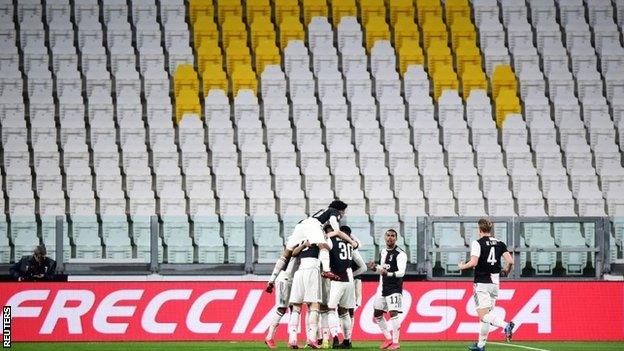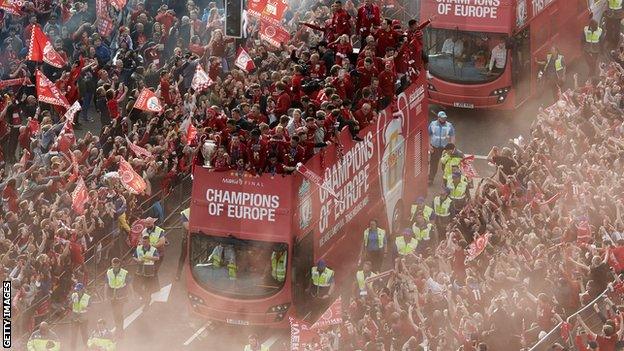Coronavirus and Premier League: Key questions about what lies ahead
- Published

Fans wear disposable face masks prior to the Premier League match between Burnley and Tottenham at Turf Moor
British sport remains open for business - but it seems to be just a matter of time before the need to protect the public from the coronavirus outbreak causes major disruption to the Premier League.
Until government advice changes, the English top flight will carry on as normal, starting with Wednesday's rearranged game between Manchester City and Arsenal at Etihad Stadium.
But if the trend in Italy, Greece and France is followed, matches behind closed doors are on their way.
BBC Sport looks at the key questions about what lies ahead.
Why closed doors?
Even without the outbreak of a potentially deadly illness, the English football calendar is packed. From now until the final day of the season on 17 May, there are just two midweek dates not being used for European matches that postponed games can fit into, the weeks including 22 April and 12 May. And those dates are required for matches rearranged because of FA Cup quarter-finals and semi-finals. The FA Cup final is scheduled for 23 May and the Champions League final in Istanbul is due to be played seven days after that. Euro 2020 starts on 12 June.
Unless matches are allowed to be played behind closed doors, it is impossible to see how the season can finish. That would raise all kinds of issues. Everyone knows Liverpool are going to be Premier League champions. But what about the top four, relegation and promotion from the Championship?
If the season does not end, how would these matters be decided? The legal implications of relegating a team from a campaign that has not reached its conclusion are mind-blowing given the finances involved. The same is true of denying sides promotion. And scrapping the whole thing and starting again is impossible to conceive of - imagine the outcry on Merseyside for a start.
Tranmere Rovers chairman Mark Palios, a former chief executive of the Football Association, believes clubs will not mount legal challenges if the league is suspended.
He told BBC Sport: "If they do, they have to mount legal challenges against the government. I think it's the wrong road. I don't think any sensible person will look at that."
There's no reason to play without fans - Guardiola
How much will it cost?
To an extent, Premier League clubs are insured against this - at least if it is a temporary measure - because of their enormous broadcasting contracts.
In their accounts to 30 June 2018, Bournemouth's £5.29m total gate receipts accounted for only 4% of total turnover. That works out at about £240,000 a game, or a month's wages for striker Callum Wilson.
At Leicester, gate receipts of £14.69m represented 8.2% of their turnover in the financial year that ended on 31 May 2019. At Manchester United, the figure is 18.75% - matchday income for 2018-19 was £112.33m, or just over £4m a match.
It is estimated Juventus lost over 3m euros by having to play their match against Inter Milan behind closed doors.
While these figures are substantial, it will only start to have an impact if the situation remains unresolved after a month or so.
What is closed doors?

Juventus beat Inter Milan 2-0 in Serie A on Sunday - but no fans were in the stadium to witness it
Earlier this season, Wolverhampton Wanderers played a Europa League tie against Slovan Bratislava behind closed doors, but there was a crowd of 20,333. This was because European football's governing body Uefa refused to let Slovan sell tickets for the fixture as punishment for racism by their supporters - but they were allowed to give them away to children.
That is not what we are talking about here.
Inter Milan's Europa League tie against Ludogorets at the San Siro in February was watched only by the support staff and senior executives of both clubs. The host broadcasters and one cameraman from each club were the only media allowed in. The situation was slightly more relaxed at Juventus' Serie A game against Inter. League officials decided to cap media numbers at 50, plus rights holders and production staff. Again, senior executives were allowed into the Allianz Arena in Turin but no relatives of the players.
It would be down to the Premier League to decide acceptable numbers once a closed doors game was confirmed.
How would the practicalities be dealt with?
Premier League matches are big business. For the biggest clubs, fans fly in from all over the world. If tickets are paid for and travel booked, what is to stop fans coming to the grounds anyway and standing outside while the matches take place? After all, fan parks at major tournaments are often made up of people who have gone to host cities even though they are not actually getting in to see any football.
One weapon that could be used to combat this is TV.
Would Sky and BT make their games available free-to-air in an effort to discourage supporters from going to stadiums? In addition, would the ban on broadcasting fixtures at 15:00 be lifted temporarily so matches could be seen whenever they are played? There has also been a suggestion fixtures may not be broadcast in pubs and bars to try to limit the numbers watching games in one place.
What about Liverpool's title celebration?

Police estimated that more than 750,000 fans lined the streets of Liverpool when the club paraded the Champions League trophy in 2019
When Manchester United ended their 26-year wait for a league title in 1993, they did so as a consequence of Aston Villa failing to beat Oldham Athletic. Thousands descended on Old Trafford to celebrate after the final whistle had sounded. It is impossible not to imagine Liverpool fans doing the same at the point when their 30-year wait reaches its end, which could be as soon as Saturday.
The fact Liverpool could achieve the feat inside their own - closed - stadium, with fans outside waiting to celebrate is surreal. One could forgive the Premier League, police, local council and anyone else who would have to deal with this situation wanting it wrapped up very quickly before the present advice changes.
And what about news conferences?
It may seem like a bit of an irrelevance but pre-match news conferences have become part of the Premier League theatre. If matches were played behind closed doors, would external media still be allowed into training grounds to put questions to managers and players? Or would internal media ask questions, which would then be distributed more widely - a scenario Sir Alex Ferguson predicted when he was Manchester United manager, although that was because he did not like dealing with external press.
Already clubs are guiding players not to sign autographs or pose for selfies with supporters.